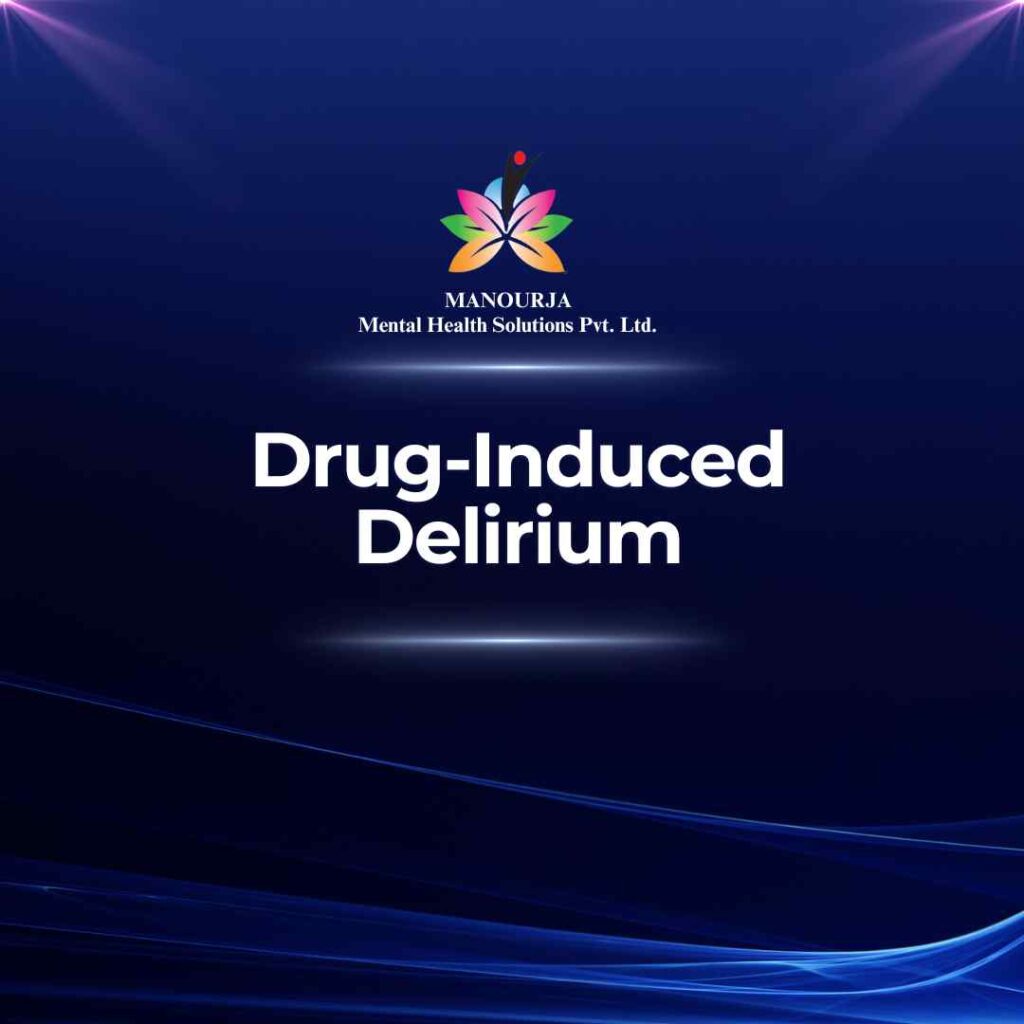Drug-Induced Delirium

Drug-induced delirium refers to a temporary state of mental confusion and cognitive impairment caused by the use of certain medications or substances. Here’s a breakdown of its meaning, characteristics, forms, and treatment:
Meaning
Drug-induced delirium occurs when the ingestion or administration of specific drugs or substances disrupts normal brain function, leading to a sudden onset of confusion, disorientation, and altered consciousness. It is typically reversible once the effects of the drug wear off or the medication is discontinued.
Symptoms
- Rapid Onset: Drug-induced delirium often develops quickly after exposure to the offending substance, ranging from hours to days. The onset can be abrupt and may coincide with the peak effects of the drug.
- Fluctuating Symptoms: Symptoms of drug-induced delirium can vary in intensity and may fluctuate over time. The affected individual may experience periods of lucidity interspersed with episodes of profound confusion, agitation, or drowsiness.
- Impaired Consciousness: Individuals with drug-induced delirium may exhibit altered levels of consciousness, ranging from hyperactivity and restlessness to hypoactivity and lethargy. They may have difficulty maintaining attention, processing information, or interacting coherently with their environment.
- Psychomotor Disturbances: Motor abnormalities such as agitation, pacing, or slowed movements may be present in drug-induced delirium. These disturbances can manifest differently depending on the specific drug involved and the individual’s reaction to it.
- Perceptual Abnormalities: Hallucinations, delusions, and perceptual distortions may occur in drug-induced delirium, contributing to the individual’s confusion and distress. These sensory disturbances can involve alterations in visual, auditory, tactile, or olfactory perceptions.
Forms
Drug-induced delirium can manifest in various forms, depending on the type of drug or substance involved and individual factors such as dosage, duration of use, and susceptibility. Common forms include:
- Anticholinergic Delirium: Caused by medications with anticholinergic properties, such as certain antihistamines, antipsychotics, and medications for overactive bladder.
- Sedative-Hypnotic Delirium: Associated with the use of sedative-hypnotic medications, including benzodiazepines, barbiturates, and sleep aids.
- Alcohol Withdrawal Delirium: Occurs during withdrawal from alcohol in individuals with alcohol dependence or abuse, also known as delirium tremens (DTs).
- Opioid-Induced Delirium: Linked to the use of opioid medications, particularly in high doses or in individuals with opioid tolerance or dependence.
Treatment
- Discontinuation of the Offending Drug: The primary treatment for drug-induced delirium involves identifying and discontinuing the medication or substance responsible for the symptoms. This allows the body to metabolize and eliminate the drug, gradually restoring normal brain function.
- Supportive Care: Providing a supportive and safe environment is essential for managing drug-induced delirium. Close monitoring of vital signs, hydration, nutrition, and sleep is important to prevent complications.
- Symptom Management: Medications may be used to manage specific symptoms of drug-induced delirium, such as agitation, hallucinations, or insomnia. However, these medications should be used judiciously and under medical supervision to avoid exacerbating delirium or causing adverse effects.
- Medical Evaluation: In severe or prolonged cases of drug-induced delirium, a comprehensive medical evaluation may be necessary to assess for underlying medical conditions, electrolyte imbalances, or other contributing factors that require specific treatment.
Overall, timely recognition and management of drug-induced delirium are crucial to minimize the risk of complications and promote recovery. Collaborative care involving healthcare professionals from various disciplines is essential for providing comprehensive and effective treatment.
At MANOURJA, we believe in the transformative power of counseling. Our experienced therapists offer a safe and supportive space where you can explore your thoughts, emotions, and challenges. Through personalized counselling sessions, we’ll work together to develop coping strategies, build resilience, and achieve lasting positive change. Discover the path to a healthier, happier you with MANOURJA counselling services.
MANOURJA Rehabilitation Services
At MANOURJA, we’re dedicated to helping you in rebuild your life, after difficult times. Our rehabilitation services focus on understanding what you need to move forward, whether you’re recovering from addiction, trauma, or any psychological – social challenges. We create personalized plans, that are all about helping you, regain your strength and find hope again. With a caring team by your side, you’ll have the support to make real progress and take steps toward a brighter, healthier future.
